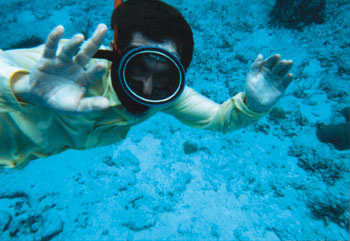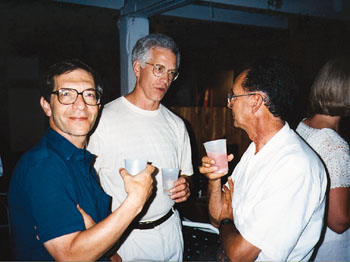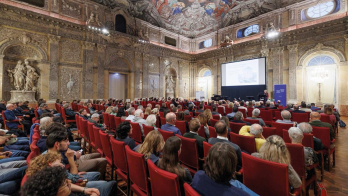An unlikely blend of geography, sponsorship and physics focus seems to work. Founding director Tom Ferbel describes a 20-year tradition of NATO-sponsored physics study institutes in the West Indies.

My wife Barbara and I picked Bermuda for our first family vacation. However, a delay in our bubble chamber run at SLAC forced us to change plans and we wound up instead in the less popular, sleepy island of St Croix in the US Virgin Islands (part of the Leeward Island archipelago). It was hot, beautiful and relaxing.
Some 10 years later, I heard that the West Indies Lab at St Croix was opening a conference centre and I thought it would be wonderful to offer our hard-working graduate students and postdocs at Fermilab an opportunity to have a bit of fun in the sun and, simultaneously, learn some particle physics. There were already several schools for theorists at that time, so I decided to propose a summer institute for experimenters.
It turned out to be far easier to make the proposal than it was to find support for it. After I failed with our standard funding agencies, Maurice Jacob suggested that I turn to NATO. Being a confirmed pacifist, I felt awkward dealing with NATO. However, their totally defence-oriented posture (at that time) persuaded me to try Jacob’s idea. It worked. For the past 20 years, NATO’s Division of Scientific Affairs has been generous and flexible in its support of the biennial Advanced Study Institute (ASI). In addition to NATO, the ASI at St Croix has been supported throughout by the US Department of Energy, the US National Science Foundation, Fermilab and the University of Rochester.
Only once did NATO balk at the school being held in the Virgin Islands, so that year it was transferred to Lake George in New York State. However, NATO agreed that St Croix was probably no more exotic to Americans than Corsica is to Europeans, and we were allowed to return to the Caribbean.
St Croix is, of course, quite exotic, but we managed to survive the monstrous cockroaches, poisonous trees and fruit, the unbelievably strong sun and even the hurricanes. It has been a great adventure, from both a scientific and a social perspective. Many of the students have become respected leaders in the field and, as far as I can recall, only two eventually switched to theory. Former lecturers have continued to make important contributions to particle physics and an unusually large number have become directors of laboratories such as CERN, DESY, Fermilab, ITEP, ITP and SLAC.
The scientific programme
The speakers were almost always superb and the students fully engaged. Although the lectures were intense, everyone had fun. The informal interactions and relaxed atmosphere often rekindled enthusiasm for physics in students whose morale was ebbing at the end of their PhD studies, and the cameraderie led to the forging of lasting professional ties and friendships among the participants.
The scientific programme was always the main focus at the ASI, with lectures that consisted of a mixture of the most exciting topics in the field developments in accelerators, particle detectors, aspects of data acquisition and reconstruction, statistics and, of course, the latest results from the forefronts of experimental particle physics and particle theory. Occasional diversions into astrophysics and cosmology were always welcome and enjoyable.
I can recall many unforgettable images. Our trips into the rain forest and to the reefs of the Buck Island Underwater National Park were great. Konrad Kleinknecht is still proud of having rescued an overenthusiastic Yau Wai Wah from drowning, after Wah jumped into the water to get a closer look at the sea menagerie, without the benefit of a life-jacket or any previous swimming experience.

It was fascinating to hear Bob Wilson lecture on his schemes for building a charm/tau factory to fit in the parking lot of Columbia’s Nevis Labs. At that same session, I persuaded the youthful Chris Quigg to offer a series of six lectures (to save money on speakers), and the poor fellow spent most of his time at St Croix writing transparencies. He also discovered that the 150 proof Cruzian rum served as an excellent eraser of permanent markers, so he could not have been working all of the time.
Students and lecturers rarely missed any of the sessions. Consequently, when most of our Mediterranean participants did not show up for an evening discussion, we realized that something was awry. It turned out that Capt. Guido Martinelli had rented a large sailboat and, far out of Christiansted harbour, its rudder had broken. It kept going round in circles until Rosy Mondardini saved the day by reaching the Coast Guard on the short-wave radio.
An impressive sight was John Iliopoulos emerging from the sea with an enormous parrot fish that he had harpooned. We later ate it for dinner. Then there is the image of Nicola Cabibbo enjoying the cuddly teddy bear he was given by the students.
Most of the institutes were held at the Hotel on the Cay, on a tiny speck of sand located in the scenic harbour of Christiansted. The Cay could only be reached by motor boat from the dock at Christiansted, and it was tough luck if you got stuck after hours unless you happened to be a very strong swimmer, as Aurore Savoy and her bevy of admirers proved on several occasions.
We were close to panic at least twice, and both times it involved food. One evening at dinner, someone made some playful, but chauvinistic, remarks and a piece of food was thrown back in response. This confrontation developed as close to a Mack Sennett food fight as I have ever witnessed. My pleas for calm prevailed and they all made up and parted friends. The other near-panic situation occurred when the entire kitchen staff quit on the first day of one of our meetings. Barbara and I had to cook and serve breakfast, but fortunately by lunchtime we were rescued by the beach restaurant.
It has been a wonderful and educational experience to interact with all of the brilliant students, lecturers and advisers I have met as a result of organizing the ASI at St Croix. Next year, Misha Danilov and Harrison Prosper will be taking it over and I wish them as much satisfaction and enjoyment as I have had running it in the past.







